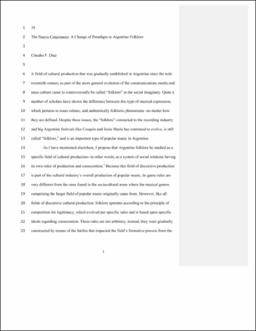| dc.contributor.author | Díaz, Claudio Fernando | |
| dc.date.accessioned | 2023-09-12T19:01:38Z | |
| dc.date.available | 2023-09-12T19:01:38Z | |
| dc.date.issued | 2016 | |
| dc.identifier.isbn | 978-0-252-09843-7 | |
| dc.identifier.uri | http://hdl.handle.net/11086/548896 | |
| dc.description.abstract | A field of cultural production that was gradually established in Argentina since the mid twentieth century as part of the more general evolution of the communications media and mass culture came to controversially be called “folklore” in the social imaginary. Quite a number of scholars have shown the difference between this type of musical expression, which pertains to mass culture, and authentically folkloric phenomena--no matter how they are defined. Despite these issues, the “folklore” connected to the recording industry and big Argentine festivals like Cosquín and Jesús María has continued to evolve, is still called “folklore” and is an important type of popular music in Argentina. As I have mentioned elsewhere, I propose that Argentine folklore be studied as a specific field of cultural production--in other words, as a system of social relations having its own rules of production and consecration. Because this field of discursive production is part of the cultural industry’s overall production of popular music, its game rules are very different from the ones found in the sociocultural areas where the musical genres comprising the larger field of popular music originally came from. However, like all fields of discursive cultural production, folklore operates according to the principle of competition for legitimacy, which evolved per specific rules and is based upon specific ideals regarding conseration. These rules are not arbitrary; instead, they were gradually constructed by means of the battles that impacted the field’s formative process from the 1920s on. This is how the “classic” paradigm of production -as I call it--specific to the field of folklore was constructed. | es |
| dc.format.medium | Impreso | |
| dc.language.iso | eng | es |
| dc.rights | Attribution-NonCommercial-ShareAlike 4.0 International | * |
| dc.rights.uri | http://creativecommons.org/licenses/by-nc-sa/4.0/ | * |
| dc.subject | FOLKLORE | es |
| dc.subject | DISCURSO | es |
| dc.subject | NUEVO CANCIONERO | es |
| dc.subject | PARADIGMA | es |
| dc.title | The Nuevo cancionero: A change of paradigm in argentine folklore | es |
| dc.type | bookPart | es |
| dc.description.fil | Fil: Díaz, Claudio Fernando. Universidad Nacional de Córdoba. Facultad de Filosofía y Humanidades. Escuela de Letras; Argentina. | es |
| dc.description.field | Ciencias Sociales Interdisciplinarias | |
| dc.book.city | Chicago | |
| dc.book.country | Estados Unidos | |
| dc.book.editorial | Ed. Society of ethnomusicology & University of Illinois Press | |
| dc.book.firstpage | 279 | |
| dc.book.lastpage | 302 | |
| dc.book.pages | 370 | |
| dc.book.role | Autor | |
| dc.book.title | STUDIES OF LATIN AMERICAN MUSIC | en |





